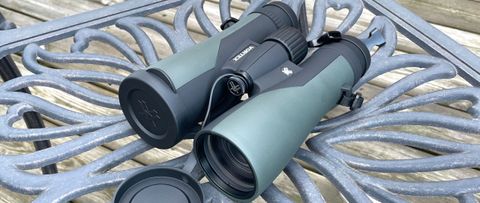Space Verdict
If you want to go to the next level with your binocular stargazing then the Vortex 10x50 Crossfire HD roof prisms bring super-sharp views andcome with a useful harness and an excellent padded case.
Pros
- +
Sharp and bright images
- +
Harness included
- +
Padded shoulder/chest bag
- +
Wide field of view
Cons
- -
Annoying lens caps
- -
Fiddly harness
- -
Slight false color in views
Why you can trust Space.com
The Vortex 10x50 Crossfire HD are one of the best binoculars available, not because you seemingly get more than what you pay for, but because they offer sharp, bright and contrasting views of everything from wildlife at dusk to glistening stars by night. Better still, all that comes in sleek and solid casing, and something you normally don’t see with any binoculars, a chest harness. For stargazers, that’s a bit of a boon. After all, staring at the night sky, craning your neck upwards and holding heavy glass up can be very tiring, so anything that makes observing the night sky less physically demanding, and more comfortable is helpful. However, there’s a lot more to like about the Vortex 10x50 Crossfire HD.
Magnification: 10x
Objective lens diameter: 50mm
Angular field of view: 6.1 degrees
Eye relief: 17mm
Weight: 30.4oz
Better still, all that comes in a sleek and solid casing, and something you normally don’t see with any binoculars, a chest harness. For stargazers, that’s a bit of a boon. After all, staring at the night sky, craning your neck upwards and holding heavy glass up can be very tiring, so anything that makes observing the night sky less physically demanding, and more comfortable is helpful. However, there’s a lot more to like about the Vortex 10x50 Crossfire HD.
Vortex 10x50 Crossfire HD: Design
- Roof prism optics
- BaK-4 glass prisms
- Padded chest case/harness
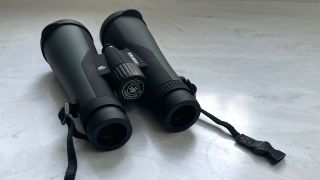
You don’t often see a pair of binoculars with a free chest harness in the box. However, the padded case you get with the Vortex 10x50 Crossfire HD forms part of the harness so there’s no way of using the harness without carrying the case. It’s also impossible to use the padded case as a shoulder bag, though you could just attach the neck strap in the box and use that while the binoculars sit secured inside.
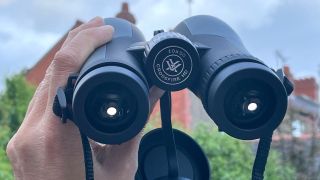
The Vortex 10x50 Crossfire HD are roof prism binoculars, which means a relatively compact and space-saving design of two tubes joined by a small hinge in the center that houses the optics and the focusing knob. The lens caps on the 50mm objective lenses are tethered to the hinge.
- Tethered objective lens caps
- Rain guard for eyecups
- Neck strap
- Padded carry case
- Chest harness
While the lenses themselves use HD glass to reduce chromatic aberration, which tends to produce color fringing (most obviously as a purple or yellow line around bright objects, such as the Moon and bright stars). HD glass also boosts contrast and resolution for a crisp display. High-density BaK-4 glass prisms, which are of better optical quality than BK-7, are used on the Vortex 10x50 Crossfire HD, which also boasts multiple anti-reflective coatings.
The finish on the Vortex 10x50 Crossfire HD’s two-tone green and black rubber armor is smoother than on most. Despite being soft to the touch they’re easy to hold steady, with their indents on the undercarriage and a weight of 30.4oz/862g that makes them reasonably easy to hold steady for long periods. As you would expect on a pair of step-up binoculars, the Vortex 10x50 Crossfire HD binoculars are waterproof and nitrogen-purged, so won’t be prone to fogging up.
Vortex 10x50 Crossfire HD: Performance
- Bright and sharp images
- No chromatic aberration
- 6 ft/1.82m close focus
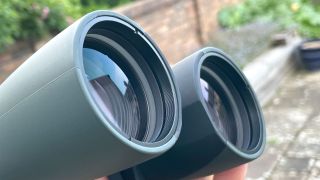
The Vortex 10x50 Crossfire HD gives excellent views in all scenarios, but it’s important not to confuse ‘HD’ with ‘ED’, the latter referring to extra-low dispersion glass. That’s not what the Vortex 10x50 Crossfire HD possesses, but it nevertheless manages to produce a great balance between brightness and sharpness. It excels with the latter, which makes the Vortex 10x50 Crossfire HD a great candidate for use during the day for wildlife observations and spectator sports. Objects are clear and sharp in the majority of the field of view and only take a tiny, almost noticeable dive towards the very edges of the fields of view.
The angular field of view is 6.1 degrees, which is larger than some other binoculars of this size, making the Vortex 10x50 Crossfire HD ideal for scanning across the rich star fields of the Milky Way. They do well in low light — giving crisp and contrasty views of star clusters and galaxies.
We were able to see some double stars with ease. And got a clear line around a bright Moon — no sign of any chromatic aberration here — though there was a hint of false color. A joy to use, to hold (and to harness), we can recommend the Vortex 10x50 Crossfire HD purely on their optics, but also for their excellent build quality.
Vortex 10x50 Crossfire HD: Functionality
- Excellent padded case and harness
- Objective lens caps are fiddly
- Shoulder strap doesn't have clips

Although we were impressed by some aspects of the chest harness it also feels like a big missed opportunity. On the plus side, it works really well, with the clasps reasonably easy to put over the head, attach around the waist and secure using a couple of easy-to-reach soft tags.
Those ribbon-like tags also include a couple of fasteners that link to their opposites fixed to the neck strap loops on the sides of the Vortex 10x50 Crossfire HD. It mostly works well, with the harness affording the Vortex 10x50 Crossfire HD a lot of freedom while out of their padded case. There's also that added peace of mind that you can just drop them and they’re going to be safe.
Obviously what you’re actually going to do is put them back in their padded case, which is right there in front of you. The case is excellent, with a pocket on the rear and two webbed, elasticated pockets for storing sundries such as a laser pen or a lens cloth.
Sadly the binoculars don't slip easily enough back into the padded case as we'd like — the case tends to be very slightly deeper and wider at the bottom. We were also frustrated that the shoulder strap supplied in the box doesn’t use the same clips as the harness. This means you have to physically untie the clips on the binoculars if you want to swap to the shoulder strap. So are the objective lens caps, which are attached not to the end of the tubes, where they could hang down when the Vortex 10x50 Crossfire HD's are in use, but to the tripod adapter between the tubes.
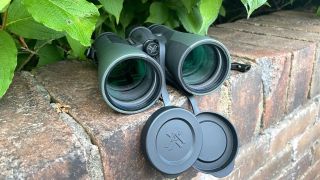
Being of unwieldy size, the lens caps tend to foul each other, with one often pushing the other over the front of the objective lenses. They got so annoying during our review that we removed them and put them in the padded case’s zipped pocket. Perhaps that’s what it’s really for, but it nevertheless seems a failure of design.
Few users will need to use a tripod with the Vortex 10x50 Crossfire HD, though a small 3/4-inch adaptor is provided; you can reveal it by unscrewing a knob between the objective lenses, which is also how to remove the tethered lens caps.
Wearers of spectacles will be pleased to know that the Vortex 10x50 Crossfire HD has some excellent quality twist-up eyecups that offer 17 mm eye relief, which should be plenty for all users to get immersive views.
Should you buy the Vortex 10x50 Crossfire HD binoculars?
A great quality pair of mid-range binoculars, the Vortex 10x50 Crossfire HD have a build quality that’s hard to beat. Hinges, knobs and eyecups are all smooth to use while at the same time offer enough resistance to stay exactly where you want them. The optics are excellent, with bright and sharp views across almost the entire field of view. Thoroughly enjoyable to use, the only issues we have with the Vortex 10x50 Crossfire HD are with its tethered lens caps. These often flap in front of the lenses when the binoculars are in use and the chest harness/padded bag array could work better with the neck strap. However, that’s nit-picking because as a package the Vortex 10x50 Crossfire HD binoculars are hard to beat.
If the Vortex 10x50 Crossfire HD isn’t for you
A similarly mid-range package to the Vortex 10x50 Crossfire HD is the Nikon Action EX 12x50 Binocular, which offers a touch more magnification and a Porro prism design that makes them significantly wider. If you’re after a more affordable pair, the Opticron Adventurer II WP 10x50 roof prism binoculars come recommended while the Celestron SkyMaster 25x100 Binocular will give you a telescope-like close-up, though they do need to be mounted on a tripod.
Join our Space Forums to keep talking space on the latest missions, night sky and more! And if you have a news tip, correction or comment, let us know at: community@space.com.

Jamie is an experienced science, technology and travel journalist and stargazer who writes about exploring the night sky, solar and lunar eclipses, moon-gazing, astro-travel, astronomy and space exploration. He is the editor of WhenIsTheNextEclipse.com and author of A Stargazing Program For Beginners, and is a senior contributor at Forbes. His special skill is turning tech-babble into plain English.
